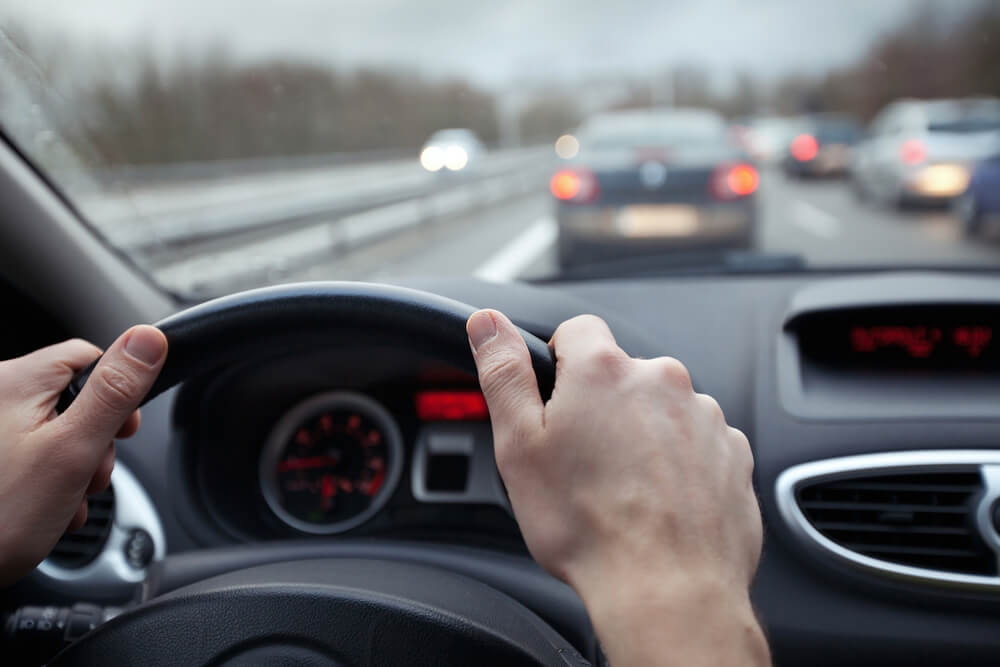Reclaim Your Commute

Commuting gets a bad rep. It’s often seen as a necessary evil of the work week that many of us have to do. In fact, according to Department for Transport data, the average UK car commute on a daily basis is 25 minutes. For London folks, that gets as high as 48 minutes in the centre of the city! And while those in North East London commute have it slightly better off, they still rack up a 20 minute average.

So, it’s clear we’re spending a lot of time in our cars. But what if that journey before and after work could be reframed from monotony to me-time?
Obviously there are limits to what you can do behind the wheel (we’re not suggesting you try and squeeze in your morning workout mid-drive), but there are ways you can level up your commute and make it work for you.
Chances are, you’re listening to something en route. But what you listen to is key – whether that’s an upbeat podcast, relaxing music or that audiobook you haven’t got round to starting.
Of course, safety first. It’s important to note that The Highway Code advises against excessive noise which may distract you from important sounds like sirens - which could lead to a £100 fine and three penalty points - and also makes it illegal to use a handheld mobile phone while driving.
But as long as you follow safe practices, your daily drive can be repurposed as valuable down time on a busy workday. Here’s how:
How different driving activities make you feel
Just how much can the type of content you consume impact how you feel?

Music
Let’s start with music. According to a recent study, a whopping 89% of UK drivers listen to music when they drive, and it has a huge impact on everything from mood to focus.
We analysed the top 50 playlists on Spotify using the keywords ‘drive’ or ‘driving’ in their title and identified their BPM (beat per minute). The average BMP across these playlists was 123, which, according to Landr, is classified as fast and is associated with feelings of excitement, happiness, energy, and motivation, often leading to movement like dancing – hopefully reserved for outside the car!
Out of these 50 playlists, 37 were deemed as fast (120+ BPM) and 13 were deemed as moderate (60-120 BPM). None of the playlists were of BPM of under 60 (<60 BPM). So it seems like the nation prefers an up-tempo beat while on the road.
But did you know that while upbeat music can help feel more energised – understandable in an early morning commute – it can also increase anxiety and negatively impact your driving?
According to one study, ‘in some situations, listening to music, especially high volume and fast tempo music, has negative effects on driving performance.’
On the flip side, while music with a slow BPM (under 60 BPM) can induce feelings of calmness and relaxation, it could also trigger sadness and even drowsiness. Not good either.
So, what’s the sweet spot? Moderate BPM (60-120 BPM) is considered neutral and can be calming or uplifting, depending on other musical elements. So, try mixing your playlists up and include some more moderate BPM played at a lower volume to make your commute more enjoyable (and potentially safer).

Podcasts
Using official Spotify data, we’ve identified the top 50 podcasts in the UK and analysed their genre and mood to determine how they can make you feel on the road.
The top 50 podcasts on Spotify span several genres, including comedy (20), society and culture (7), news (5), health and fitness (4), business (3), education (3), sports (3), history (2), TV and film (2), and true crime (1).
The majority of these are categorised as uplifting (22), but other moods include motivational (10), curious (9), unease (7), serious (5) and neutral (3).
So, great news for podcast fans! There are loads of popular podcasts you can choose from that can spark an uplifting and motivational mood while you’re on your commute. Whether you want to start the day on a positive note or shake off work on your way home, they’re a great option for injecting some joy into your journey.

Audiobooks
Struggling to make time for reading? If you can’t fit a relaxed read into your daily routine, audiobooks could be a great way to enjoy your commute and get through that book list you haven’t started.
Using official Audible data, we’ve identified the top 50 audiobooks in the UK and their genre and mood.
Much like podcasts, the top audiobooks range in genre. Standout categories include literature and fiction (10), biographies and memoirs (7), children’s audiobooks (7), romance (6), science fiction and fantasy (6), mystery, thriller and suspense (5), and health and wellness (4).
The majority create a mood of suspense (14), but other moods include motivational (8), variable (8), curiosity (7), unease (7), serious (4), and uplifting (2).
Since suspense, curiosity and serious reads make up 50% of the most popular audiobooks, these aren’t the most ideal option for long car rides if you are an anxious driver. But exploring motivational or uplifting options could be an entertaining way to mix up your morning commute!
Carefully choosing the type of content you listen to while commuting can have a big impact on how you feel during and after your drive. But to understand better what kind of content you should consume, you need to understand your default driving mood.

Understand your driving mood
Are you more of a feel-good commuter or an anxious commuter? These 10 questions below can help you decide. Simply respond to them with YES or NO. The more questions you respond with YES to, the more likely you are to be an anxious driver.
Do you find driving stressful?
Do podcasts and music distract you when driving?
Would you consider yourself an anxious driver?
Do you feel nervous when driving in heavy traffic?
Do you get frustrated or agitated by other drivers’ actions?
Do you feel exhausted after completing your drive?
Do you find yourself mentally rehearsing or overthinking your route before leaving?
Do you feel uneasy when driving in bad weather?
Do you find it difficult to relax during long drives, even when the road is clear?
Do you feel overwhelmed when navigating busy intersections or highways?
Anxious commuter |
Feel-good commuter |
If you answered YES to 6 or more of the questions, you are leaning towards being an ‘anxious commuter’. You tend to worry about driving and circumstances like weather and heavy traffic can impact how you feel about your commute. |
If you answered YES to 5 or less of the questions, you are closer to being a ‘feel-good commuter’. You are a confident driver and time you spend commuting is something that you enjoy regardless of how long or busy it is. |
If you fall into the anxious category, you’re not alone. In fact, according to Aviva research published in 2023, 1 in 7 motorists say anxiety affects their driving.
Expert Charlotte Bailey, therapist and psychotherapist at Charlotte Bailey Therapies says: “Driving anxiety can arise from a variety of factors. At its core is the brain’s natural threat response, led by the amygdala, which can become overactive during driving - a task that requires constant vigilance and rapid reactions. While this heightened state of alertness is protective, it can sometimes spiral into disproportionate anxiety.”
There’s a lot you have to be aware of at once. According to Bailey: “External stressors such as bad weather, heavy traffic, or unfamiliar roads can heighten feelings of vulnerability, especially if your nervous system is already dysregulated by stress or other issues. For some, having passengers in the car, particularly children, adds to the pressure, as you try to manage distractions while feeling responsible for their safety.”
It’s therefore crucial before you set off to make sure you understand what you need when you’re driving.
Bailey says: “Recognising how your brain and body respond to perceived threats, alongside understanding the role of past experiences, uncertainty, maintenance factors, and external pressures, is key to addressing the root causes and building confidence on the road.”

Your car commute reimagined
Whether you fell into the anxious category or are generally a feel-good commuter, we’ve got the optimum audio recommendations for all drivers! Based on our findings, these lists will help you level-up your journeys and create a more enjoyable commute.
Just remember to follow the The Highway Code guidelines to ensure the roads are a safe space for all drivers.
Playlist recommendations:
Here are some Spotify playlists with a moderate BPM, ideal for both anxious and feel-good commuters:
Podcast recommendations:
The following 10 podcasts offer a good range from uplifting to motivational choices, great for any commuter.
Audiobook recommendations:
Focusing on motivational and uplifting audiobooks from the top 50 UK choices on Audible, we selected 10 for you to enjoy in the car.
Mindfulness tips
Mindfulness can be another helpful tool for managing driving anxiety, as it can help ground you in the present and regulate your nervous system. Bailey also shared three mindfulness techniques to try:
Start by grounding yourself before you even begin driving. Sit in the car and take a moment to notice your body in contact with the seat, your feet on the pedals, and your hands on the steering wheel. Slow, deep breaths can settle your nervous system and prepare you to drive more calmly and with more focus.
Learning to “unhook” from anxious thoughts and feelings can also be a game-changer. Instead of getting caught up in them, acknowledge them without judgment to create distance and reduce their intensity.. For instance, say to yourself, “I’m noticing the thought that the driver behind me is annoyed,” or “I’m noticing that I’m feeling nervous right now.”
Breathing exercises are particularly helpful for regulating your nervous system when you’re feeling on edge. Box breathing - inhaling for four counts, holding for four, exhaling for four, and holding again for four - is a great option. Take some time to experiment and find a pattern that feels right for you.
The takeaway
There’s often no avoiding the need to commute. But with these lists, you can stop dreading your drive and start thinking of it as an opportunity for music, mindfulness or simply a bit of me-time!
Next time you get in your car, stick on a moderate BPM playlist for feel-good beats, an uplifting podcast or a motivational audiobook and see how it transforms your travel.
At Car Finance 247, we’re there for our drivers every step of the journey. While sometimes driving is a necessity, there are things we can do to feel good about it – from choosing the right car to picking the right entertainment!
Methodology and sources
We identified the most popular playlists on Spotify that include words ‘drive’ or ‘driving’ and used Chosic to identify BPM for 50 of them.
To identify the most popular podcasts we used official Spotify data and we took the same approach for audiobooks using Audible bestsellers data accessed in January 2025.
